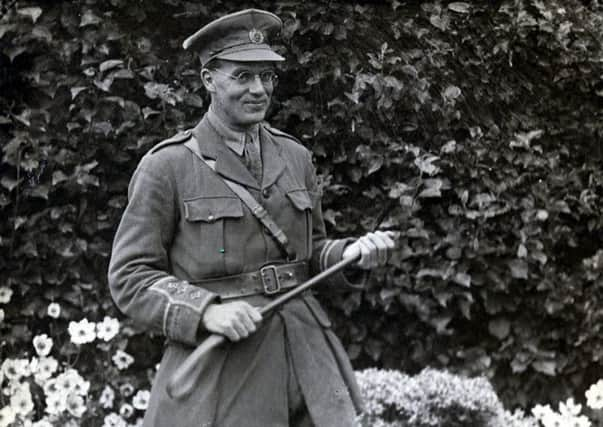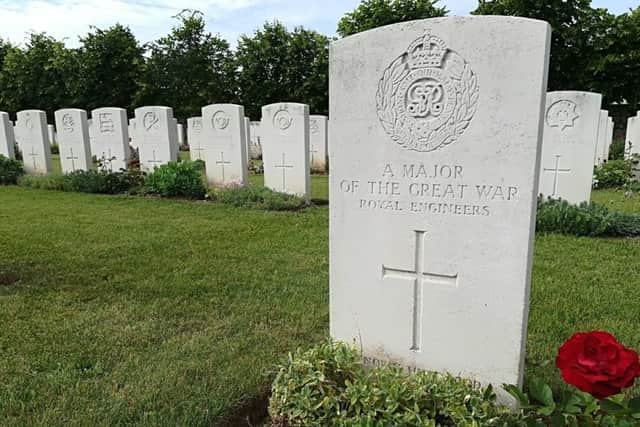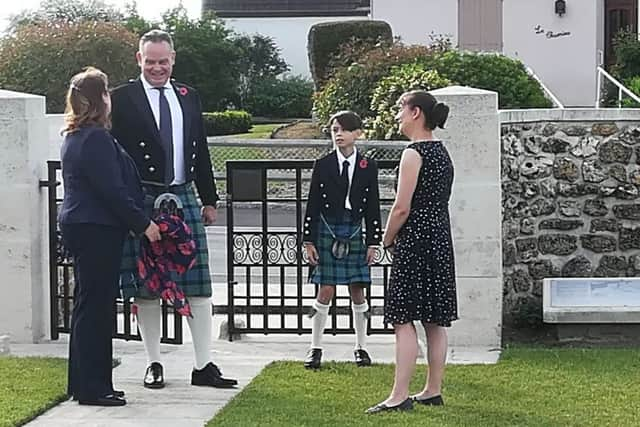'Unknown soldier' from Scotland remembered 100 years on


Relatives travelled from around the world to pay their respects today at the graveside of Major Alexander Soutar, of the Royal Engineers, who died on May 28 1918, in a firefight near Reims in the Champagne region.
Major Soutar, who was known to his family as Alastair, was the son of a Free Church minister from Cullen in Moray who also spent part of his childhood in Glasgow and Thurso in Caithness.


Advertisement
Hide AdAdvertisement
Hide AdSoutar family history was long peppered with tales of the fighter who died in France but whose body was never found.
Now, a new memorial stone has been dedicated at Major Soutar’s grave in a cemetery in Jonchery-Sur-Vesle following research by David Tattersfield, of the Western Front Association.
Ten of Major Soutar’s descendants, most who travelled from Vancouver, New York and Hong Kong, attended the service this morning.


Rob Soutar, 28, from Vancouver, played the bagpipes at the graveside in honour of his great, great uncle.
Advertisement
Hide AdAdvertisement
Hide AdMr Soutar, speaking from France, said: “It is very moving to be here. Normally, the events that I play at don’t really hit close to home but as soon as I got here, I felt a sense of duty. To see the headstone today is a very important moment for our family.”
James Soutar, the great nephew of Major Soutar, travelled from Hong Kong with his son Alistair, 10, who is named after the Scots soldier.
A former pupil of Fettes College in Edinburgh, Mr Soutar said: “No one knew where he has been for all this time. Today, a large number of his relatives have gathered to give him the send off he deserves. It is a very meaningful occasion for us.
“If it wasn’t for the research carried out by the Western Front Association, Alastair Soutar would always be lost. We are so grateful for all the work they have done.”
Mr Soutar’s son read In Flanders Fields at the service.
Advertisement
Hide AdAdvertisement
Hide AdMajor Soutar, who fought at both the Somme and Passchendale, died almost instantly after being shot in the chest by German forces near the village of Hermonville, around 12 noon on May 28, 1918.
He was commemorated on the Soissons Memorial but no grave in his name existed.
David Tattersfield, of the Western Front Association, began researching an unknown soldier’s grave at Jonchery-Sur-Vesle and concluded that it must belong to Major Soutar.
Major Soutar was one of only two majors from the Royal Engineers to fight in the area around the time of his death, with a grave found for the other soldier near Boulonge.
Advertisement
Hide AdAdvertisement
Hide AdWar diaries written by his company also placed Major Soutar in the area at the time.
Mr Tattersfield, vice chairman of the Western Front Association, believes that when his body was buried in the cemetery in the 1920s, the only identification he carried was the rank insignia on the collar of his uniform.
Mr Tattersfield said: “It has been a very rewarding experience to find that, at last, one of the many graves of unknown soldiers has been identified and that the family is able to pay their respects.”
Mr Tattersfield worked with the Commonwealth War Graves Commission and the Joint Casualty and Compassionate Centre at the Ministry of Defence on the case.
Advertisement
Hide AdAdvertisement
Hide AdMajor Soutar was eldest of six children of Mary and Alexander, who served as a minister with the United Free Church.
Within a year of his birth, the family moved to Glasgow, where Rev Alexander took up an appointment at the Springburn Free Church.
In 1899, the family moved to Thurso, where his father also served.
It is understood that a small number of Major Soutar’s elderly descendants remain in Scotland but were unable to travel to France.
Advertisement
Hide AdAdvertisement
Hide AdA letter from a fellow soldier held in the National Archives as helped to shed some light on the character of Major Soutar.
Written by a Lieutenant Godson, who was with Major Soutar when he died, said: “I admired [your son] immensely. Everyone did. He was a man all through.”
